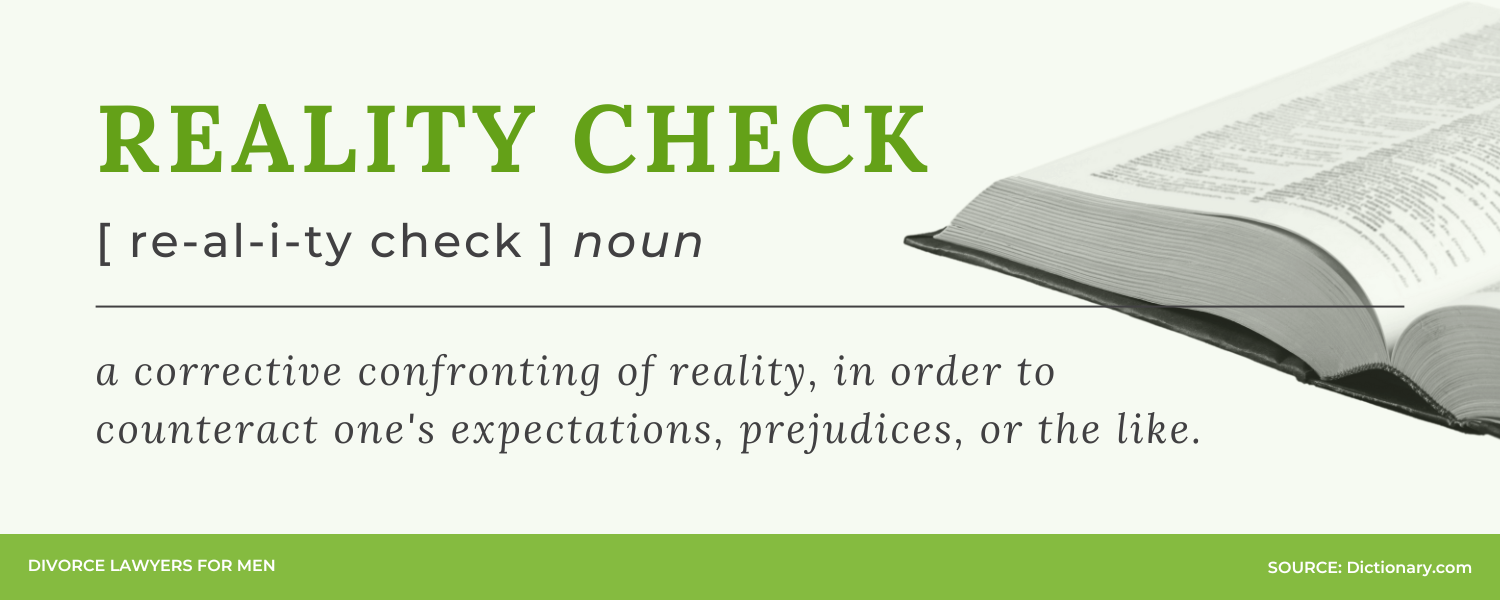The dreaded client reality check may be something that you saw coming for some time. On the other hand, it may mean that you, the attorney advocate, just had a reality check of your own and must now pass it on to your client.
What is a Reality Check?
Dictionary.com defines “reality check” as a noun: “A corrective confronting of reality, in order to counteract one’s expectations, prejudices, or the like.” As I read this, I realize that I tend to think of it, and use the term, as a verb.
I am referring to the situation in which you need to sit down with a client to discuss the fact that their case took some unanticipated turns. The outcome of a motion, or the case as a whole, will likely not meet their expectations. At best, this is unpleasant and downright uncomfortable, and at worst, this may be confrontational.

Very few attorneys look forward to this interaction, especially when our job is to advocate for our clients. It feels counterintuitive to tell clients that their views are unrealistic. To make matters worse, many clients perceive the reality check as an act of betrayal by their own attorney. They may accuse the attorney of favoring the opposing party and going against their own interests.
Remember, helping your client understand the status of their case is a vital portion in your representation of them.
When is a Reality Check Needed?
RPC Rule 1.2 states in part, “…(d), a lawyer shall abide by a client’s decisions concerning the objectives of representation and, as required by Rule 1.4, shall consult with the client as to the means by which they are to be pursued. A lawyer may take such action on behalf of the client as is impliedly authorized to carry out the representation. A lawyer shall abide by a client’s decision whether to settle a matter…”
Since our professional responsibility requires us to abide by our clients’ decisions, it follows that we are obligated to make every effort in educating and informing clients before they make choices concerning their case.
Misinformed or Misguided

People come to attorneys with an array of preconceived notions and incorrect ideas from non-legal sources. For example, friends and family often give well-intended opinions and unfounded advice. Furthermore, TV and movies set up impractical bases for the real world. Even the Internet and social media can be used to support any position someone wants to justify. Plus, potential new clients are at the defensive as they anticipate divorce and attempt to keep some control over their rapidly changing life. All of this results in clients looking at their legal issues from their own personal perspective, not objectively.
Thus, it is no surprise when clients come to us with improbable ideas on how their divorce case will proceed. To dispel their biases, we as lawyers must educate our clients on legal procedures and clearly communicate what is happening in their case. From the very beginning, prioritize candor and straightforwardness. Your client should be updated as you analyze facts and gather materials for litigation. Doing so early on and throughout your representation prepares your client for making knowledgeable decisions.
Nonetheless, be cautious of over-promising or being too negative about the opposing party or their attorney. Not only does it appear unprofessional, but it sets your client up for disappointment. You should not contribute to any unrealistic expectations, but rather moderate those concepts with education and facts. Still, that often involves a dose of compassion—let the client know you recognize and understand where they are coming from.

Seismic Shifts in the Case
Sometimes, despite having strong legal footing, the cards are simply not falling the way you predicted. For instance, a supportive witness may refuse to cooperate, important documentation is unattainable, or the court makes an erroneous ruling from left field.
Unforeseen occurrences dramatically change family law cases all the time. When these things happen and the dynamics start to shift, it is vital you promptly inform your client of the issues and the potential impacts on their case. Plan for damage control and ensure your client’s expectations are adjusted appropriately.
Unrealistic Expectations

However, there are times where your repeated efforts and explanations are not getting through to a client. They refuse to accept the legal system for what it is; they refuse to accept the facts as they have played out; or they refuse to accept responsibility for their own actions. No matter the reason, you must either part ways with the client or make a powerful effort to bring them back to reality.
Clients with unreasonable expectations will often be their own worst enemy. You may even feel like you are battling issues with your own client rather than with opposing counsel. They may think that the system moves faster than it does, or they may fail to recognize that you have other clients to attend to. They may even demand to pay less child support than what is required by the state-adjusted formula. Whatever the myriad of reasons might be, the client’s expectations of the result of their case simply do not align with the facts of their circumstance.
How to Handle a Client Reality Check
There are several ways to handle giving your client the awkward reality check. Whichever way you choose, make sure it is the best for your scenario and that it includes addressing the issues head-on.
There should be no question left about the information you impart on your client at the end of the discussion. They should clearly understand where you are coming from, what action you want to take, what action you need them to take, and the consequences, (both good and band), that you expect as a result.

Here are a few tips:
- Whenever possible, meet in person with your client. You want it known that this is an important meeting, and you want their full attention.
- Meet one-on-one. Avoid having the client’s friends or family attending the meeting. People try to save face more often when others are around. Additionally, you may be discussing issues that are confidential or privileged.
- Be pleasant, polite, and most of all, professional.
- Know your facts. Your advice and opinions won’t carry much weight if you don’t have your facts straight.
- Be an active listener. Give your client an opportunity to air their position and grievances.
- Validate your client’s concerns. Demonstrate that you have actually heard them and understand their concerns.
- Be direct and concise when explaining the case status as you see it.
- Explain the law in layman’s terms to ensure your clients’ understanding.
- Explain their options and the likely outcomes.
- Consider having your client sign a letter that explains your points and agrees to their understanding of the issues.
- Give definite timelines for when action needs to occur.
- Withdraw if necessary.
The Ultimate Reality Check – Withdrawal

The choice of withdrawing from representation is certainly an option as long as you do not have a close upcoming trial, settlement conference, or hearing date. It is a course of action to consider if you think further efforts are useless or if you have repeatedly attempted these reality checks with the same client. Do not doggedly hang on to a client with whom you do not have a good trust relationship. Your client may be better off with an attorney who is more like-minded with them than with you anyway.
Withdrawal is the ultimate reality check for your client and, by its nature, becomes the last action you take on that case. However, if you cannot come to a meeting of minds in how to move forward on their case, notifying your client that you will be withdrawing can lead to a client understanding that you are taking the issue very seriously. That may be all that is needed. Still, never use the threat of withdrawal to coerce a client into agreeing to a settlement or other course of action they object to.
Moving Forward
Of course, the ideal is that after a full explanation of the issues, your client sees the reality of their circumstances and your expectations fully align going forward in the resolution of the case. It’s even better if you have the benefit of that mutual understanding throughout your representation.
Undoubtedly, we need to meet our obligations to communicate clearly with our clients and do our best to educate them in a way that enables them to make clear and cogent decisions with their case. Sometimes tough conversations are needed to overcome a client’s unreasonable expectations. It is then when reality checks come into play. If those efforts are not successful, it may be necessary to withdraw from representation, both for your own benefit and for that of your client.
Jeanne Sockle
Jeanne, co-founder and managing partner of Divorce Lawyers for Men, is a successful civil litigator who has focused her legal practice on complex litigation, primarily catastrophic injury and wrongful death lawsuits. She has served as a member and Chair of the Washington State Bar Association Law Clerk Board, as a Thurston County Family Court Child Advocate, and as a founding member of the Thurston County Volunteer Legal Clinic.


